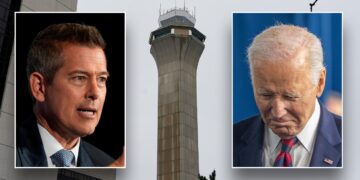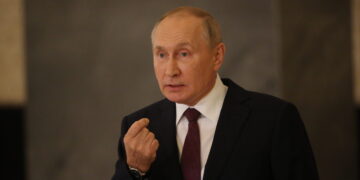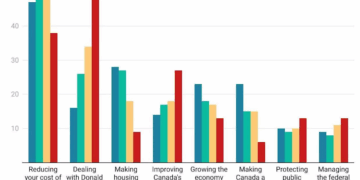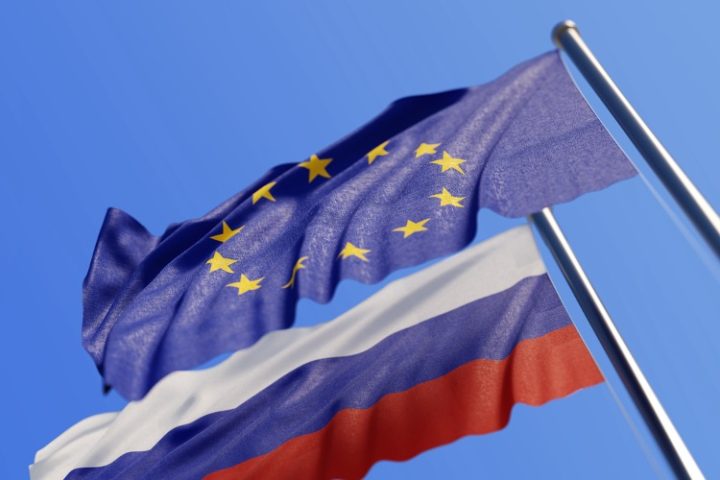
The EU has agreed to its 13th package of sanctions against Russia, the EU’s Belgian presidency announced on February 21 on X (formerly Twitter).
The package will be formally approved in time for the second anniversary of the start of the Russian military operation in Ukraine on February 24. Brussels has imposed 12 rounds of restrictions on Russia since the start of the conflict in February 2022. The existing sanctions already target a broad range of sectors and include trade embargoes, travel bans, and individual sanctions against Russian businessmen and public officials.
“EU Ambassadors just agreed in principle on a 13th package of sanctions in the framework of Russia’s aggression against Ukraine,” the Belgian presidency said, calling it “one of the broadest approved by the EU.”
European Commission President Ursula von der Leyen welcomed the agreement, saying in a post on X, “We must keep degrading Putin’s war machine.”
The new package will ban almost 200 entities and individuals from traveling to the EU, while both the individuals and companies will have their assets frozen. “With 2,000 listings in total, we keep the pressure high on the Kremlin. We are also further cutting Russia’s access to drones,” von der Leyen wrote.
German Foreign Minister Annalena Baerbock also indicated this week that the new round of sanctions will impact the supply of unmanned aerial vehicles (UAVs). As per media reports, citing European diplomats, the EU is planning for the first time to sanction companies in mainland China and in other countries including Türkiye, India, and Serbia, for helping Moscow circumvent sanctions by allegedly supplying it with components that can be repurposed for use in drones and other weapon systems.
For its part, China has responded to reports that its firms could be blacklisted, saying it rejects “illegal sanctions,” while vowing to protect the interests of Chinese companies.
The proposed sanctions were discussed on February 19 by CNBC, which interviewed some U.S. Congress members about the plans. Democrat Gerald Connolly, who sits on the House Committee on Foreign Relations, claimed “the very threat” of sanctions from the United States and potentially the EU “ought to clarify some thinking in Beijing.”
However, Chinese Foreign Ministry spokeswoman Mao Ning said on February 20 that Beijing rejects unilateral economic restrictions as a matter of principle and will defend the interests of its businesses.
”China has the right to conduct normal cooperation with countries around the world,” Mao said during a daily briefing. “We have always opposed unilateral sanctions and ‘long-arm jurisdiction’ that have no basis in international law and are not authorized by the UN Security Council.”
She rebuffed Washington’s suggestion that Chinese businesses were helping Russia with its military operation against Ukraine. Beijing has been impartial on the conflict and has been promoting a peaceful resolution, Mao claimed.
”We have not watched from afar, let alone taken advantage” of the situation, she added.
The United States previously targeted specific Chinese firms and individuals, which it accused of providing aid for Moscow’s military campaign in various ways. The new round of sanctions will reportedly be the first to directly hit the government in Beijing.
“If broad sanctions were applied to China, it would really hit home,” Connolly told CNBC. He claimed that “China has a lot more to lose than Russia” from such restrictions. Chinese Foreign Minister Wang Yi discussed the issue of unilateral restrictions and the risks of possible Western disengagement from China with U.S. Secretary of State Antony Blinken on the sidelines of the Munich Security Conference last week, his department said.
Wang said that the attempts to “build ‘a small yard with high fences’ to ‘decouple from China’ will ultimately backfire on the US itself,” and urged his American counterpart to “lift its illegal unilateral sanctions” on Chinese firms.
Meanwhile, Moscow has slammed the aforementioned Western sanctions and has repeatedly warned that they hurt the EU more than Russia in economic terms.
Besides, International Atomic Energy Agency (IAEA) head Rafael Grossi said on February 19 that the EU is dependent on Russian uranium deliveries and sanctioning them would be unrealistic.
Grossi was briefing EU foreign ministers in Brussels on the Iranian nuclear-enrichment program when the question of possible nuclear sanctions against Russia came up during an exclusive interview with Reuters.
“Many companies in the West depend on Russian supplies — enriched uranium or fuel,” Grossi said. “The consensus is [that] sanctioning Rosatom would not be realistic and it’s impractical. It would put the nuclear industry at a standstill in many countries.”
Some EU member states have suggested extending the bloc’s embargo — imposed over the Ukraine conflict — to nuclear fuel sold by Moscow. Russia’s state-owned nuclear energy giant, Rosatom, owns nearly 50 percent of global uranium enrichment infrastructure and accounted for almost 36 percent of the world’s exports in 2022.
Last November, the U.S. government noted a “gravely concerning” fact that almost 20 percent of the fuel used by American nuclear power plants came from Russia. Assistant Secretary of Energy Kathryn Huff argued that it was “critical” for the United States to end its “dependence” on Russia as a matter of national security and as a response to climate change. There has also been speculation of U.S. plans to ban the import of Russian uranium from 2028.
Trying to “reduce dependence” on Russian nuclear fuel would cost the EU billions and seemed unlikely, Grossi told Reuters. He also noted that global demand for enriched uranium was actually rising.
“Frankly, I see an increased presence of Russian uranium enrichment capabilities in the world rather than a decrease,” he told Reuters.
Grossi is poised to visit Moscow and meet with Russian President Vladimir Putin before continuing to Tehran for talks with the Iranian government about their nuclear program.
Speaking at the Munich Security Conference on February 17, Lithuanian President Gitanas Nauseda admitted that Western sanctions on Moscow have failed to destabilize the Russian economy.
Nauseda underscored macroeconomic indicators that revealed the country’s economy remained stable.
Based on recent official figures, Russian GDP climbed by 3.6 percent in 2023, outpacing both the United States and EU, and the country’s authorities expect growth of at least 2.3 percent this year.
“We have to admit that those thirteen sanctions packages — the thirteenth not yet implemented — basically had a very limited impact on the Russian economy,” Nauseda stated. He noted that Russia has become agile in circumventing restrictions, and urged the bloc to focus future measures on ways to prevent sanctions evasion.
“It is necessary to strengthen the secondary consequences and ways to circumvent these sanctions, which are so far-fetched that they practically make the sanctions mechanism itself ineffective and empty,” Nauseda said.
The Lithuanian leader also urged Brussels to step up work on ways to use frozen Russian assets for aid to Ukraine.
“We need a much faster decision on what to do with those frozen Russian assets,” he said, adding that the West still cannot find legal means to tap the funds.

































 Reaction & Commentary
Reaction & Commentary














